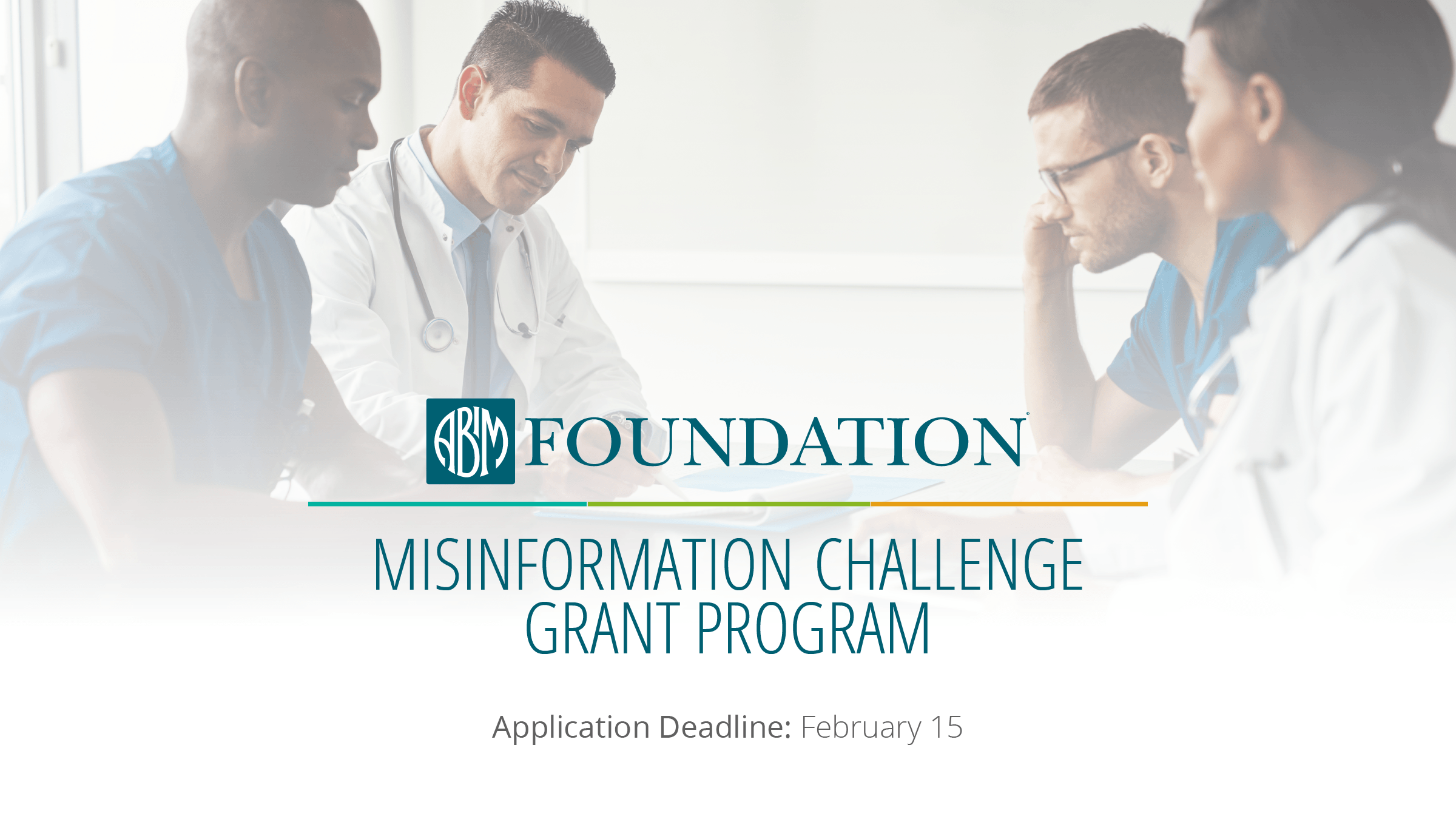ABIM Foundation leads effort on “Building Trust” among health care stakeholders
Significant gaps in how physicians and patients view trust
New research shows a significant decline in physicians’ trust in leaders of health care systems during the COVID-19 pandemic, and notable differences between how physicians and the public perceive trust in U.S. health care. The research was conducted for the American Board of Internal Medicine Foundation by NORC at the University of Chicago.
The ABIM Foundation released the research to coincide with the launch of Building Trust, a national effort that focuses on increasing trust among health care stakeholders, including patients, clinicians, system leaders, researchers, and others. Nine years ago, the ABIM Foundation created the Choosing Wisely initiative, which was nationally recognized for promoting conversations between patients and their clinicians about curbing the overuse of unnecessary medical care.
In a year of unprecedented pressure on health care, nearly one in three physicians surveyed (30%) say their trust in the U.S. health care system and health care organization leadership decreased. Only 18% report increased trust.
Health care is fundamentally grounded in a series of human relationships, and the strength of those relationships determines how well health care works
Richard J. Baron, MD
This is in stark contrast to the overwhelming trust physicians have in their fellow clinicians. Physicians report high levels of trust for other physicians and nurses (94% trusting doctors within their practice; 85% trusting doctors outside of their practice; and 89% trusting nurses)—but only two-thirds (66%) trust health care organization leaders and executives. During the pandemic, physicians report increased trust for fellow physicians (41%) and for nurses (37%).
“Health care is fundamentally grounded in a series of human relationships, and the strength of those relationships determines how well health care works,” said Richard J. Baron, MD, president and chief executive officer of the ABIM Foundation. “The pandemic bolstered trust among clinicians, but intensified physician mistrust of health care organizations. American health care has a trust problem and rebuilding it is essential.”
Overall, 78% of people say they trust their primary doctor. Significant differences exist, however, between different groups of people, with older adults (90%), white people (82%), and high-income individuals (89%) being much more likely to say they trust their doctors. Among people who report lower trust in their doctors, 25% said their doctor spends too little time with them and 14% said their doctor does not know or listen to them.
The survey shows stark differences in how physicians and patients view aspects of a medical appointment that affect trust. Nearly all physicians (90%) believe patients can easily schedule appointments, but nearly one in four patients (24%) disagree. Almost all physicians (98%) say that spending an appropriate amount of time with patients is important, but only 77% of patients think their doctor spends an appropriate amount of time with them.
In spite of these trust gaps, consumers trust clinicians—doctors (84%) and nurses (85%)—more than the health care system as a whole (64%). About one in three consumers (32%) say their trust in the health care system decreased during the pandemic, compared to 11% whose trust increased.
Trust is an essential part of medical professionalism and ultimately contributes to better patient outcomes.
Daniel Wolfson
The survey shows that government agencies have trust-building work to do. The research reveals that 43% of physicians say their trust in government health care agencies decreased during the pandemic.
“Trust in organized institutions has been declining for years and health care is not immune,” said Daniel Wolfson, executive vice president and chief operating officer of the ABIM Foundation. “Building trust requires engaging stakeholders across the health care spectrum to better identify what’s happening and share practices that increase trust between different parties. Trust is an essential part of medical professionalism and ultimately contributes to better patient outcomes.”
Focus areas for the ABIM Foundation’s Building Trust initiative include increasing relational and organizational trust, increasing equity and reducing systemic racism in U.S. health care, and the imperative of trusting science and facts, free from politics.
Leaders from all parts of the health care ecosystem will come together through the multi-year initiative to discuss how to elevate trust in health care. The effort will include significant research, dialogue and experimentation involving all parties.
A key component will be a Trust Practices Network that identifies, tests, and shares practices with the goal of building trust between health care stakeholders. The practices include interventions like:
- SCAN Health’s use of a peer advocate program to build caring relationships with plan members and encourage them to receive needed care;
- Northwestern Medicine’s African American Transplant Access Program, which strives to build trust with Black patients and increase the likelihood they will seek needed transplants and complete the necessary evaluation to be included on the transplant waiting list; and
- Scripps Clinic’s “One Thing Different” program, which gives staff and physicians the autonomy to do one thing of their own choosing to make a difference in the lives of their patients, relying on self-reflection and soul searching to improve care and enhance trust between staff and leadership.
More than 50 organizations have already contributed trust-building practices.
The NORC research was conducted between Dec. 29, 2020 and Feb. 5, 2021. The physician survey is a non-probability sample of 600 physicians. The consumer survey is a probability based sample of 2,069 respondents with oversamples for Black, Hispanic, and Asian respondents and has a margin of error of +/- 3.15 percentage points.


